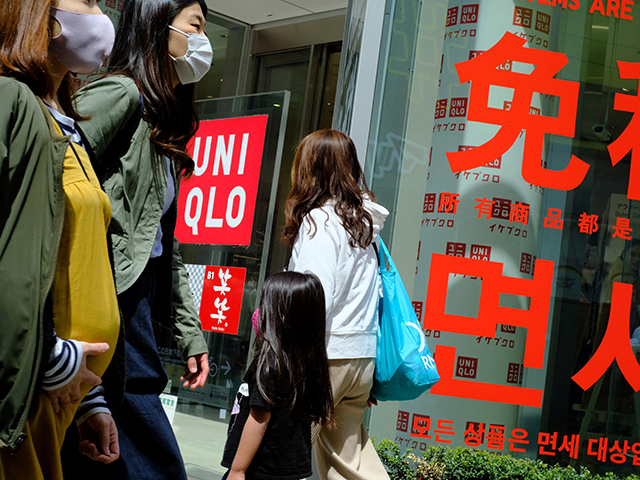The Chinese government on Wednesday denounced U.S. Customs officials for blocking a shipment of shirts from Japanese casual wear designer Uniqlo because they violated a ban on slave-picked cotton from China’s Xinjiang province.
The shipment was impounded January 5 at the Port of Los Angeles, but the action did not become major news until Reuters reported it Wednesday.
The report cited customs documents dated May 10 that said the shirts were seized due to a suspected violation of the ban on forced labor, and a protest filed by Uniqlo’s parent company Fast Retailing was denied.
“The U.S. customs document notes that Uniqlo had argued and provided proof that the raw cotton used to produce the shirts didn’t originate from Xinjiang Production and Construction Corps. Still, Uniqlo failed to provide enough information to establish the items were not produced in part by forced labor in China’s far west Xinjiang region, according to the customs agency,” Bloomberg News clarified Wednesday.
Uniqlo is one of several brands owned by Fast Retailing, the largest apparel company in Asia. The company is Japanese, but like many international clothiers, it faces scrutiny for purchasing cotton from Xinjiang, where the Chinese government is accused of employing slave labor from the brutally oppressed Uyghur Muslim minority.
Human rights groups pressured apparel companies into promising they would not use cotton harvested by slaves, with the understanding this would be a difficult promise to keep, because China supplies much of the world’s cotton, and 84 percent of China’s cotton comes from Xinjiang.
“Almost every major apparel brand and retailer selling cotton products is potentially implicated. Right now, there is near certainty that any brand sourcing apparel, textiles, yarn or cotton from the Uyghur Region is profiting from human rights violations, including forced labour, both in the Uyghur Region and more broadly throughout China,” the Coalition to End Forced Labor in the Uyghur Region, an umbrella organization composed of almost 200 worldwide human rights and labor groups, warned in July 2020.
The U.S. Department of Homeland Security (DHS) warned in December 2020 that Americans concerned about slave labor and “some of the most egregious human rights violations existing today in the modern world” should avoid buying “Made in China” clothing. The regulations under which the Uniqlo shipment was barred in January 2021 were promulgated around this time.
The Chinese Communist Party (CCP) began pushing back against the human rights campaign this spring, beginning with an all-out assault on Swedish fashion company H&M and U.S. sportswear giant Nike. The CCP used its “sharp power” economic weaponry to let these companies know they needed to stifle their criticism of forced labor if they expected to retain access to China’s valuable markets.
The Chinese Foreign Ministry on Wednesday responded to the Reuters report about Uniqlo by insisting “there is no forced labor in Xinjiang,” and reports to the contrary are “lies spread by some politicians in the US and the West are purely a malicious plot from Western countries and anti-China forces to suppress certain Chinese enterprises and industries under the guise of human rights to destabilize Xinjiang and contain China.”
“The U.S. moves are bullying practice through and through. Relevant companies should step forward and oppose such unreasonable U.S. actions,” Foreign Ministry Spokesman Zhao Lijian said, speaking two months after China intimidated the worldwide apparel industry into silence by threatening to bankrupt their Chinese operations if they didn’t keep quiet about forced labor in Xinjiang.

COMMENTS
Please let us know if you're having issues with commenting.